In today’s competitive real estate industry, effective communication is vital in building successful relationships with clients, managing leads, and closing deals. A reliable and feature-rich phone system tailored specifically for real estate professionals can significantly enhance communication efficiency, professionalism, and customer service. 90% of realtors prefer to communicate with their clients through the phone, as it’s one of the most effective communication channels.
Whether you’re an independent agent, part of a real estate agency, or managing a team of agents, having the right phone system for business can streamline your operations and give you a competitive edge.
In this blog, we will explore the key factors to consider when choosing a real estate phone system and review some popular options available in the market.
What is a Real Estate Phone System?

A real estate phone system is a telecommunications system designed specifically for the needs of real estate professionals and agencies. It offers a range of features and functionalities tailored to support the unique requirements of the real estate industry. These systems typically include virtual phone numbers, allowing agents to establish a local presence in different areas.
They also provide call forwarding and routing capabilities, ensuring that business calls are promptly directed to the right person or team with business phone lines. Interactive voice response (IVR) systems are commonly used to filter inquiries based on property type or location, saving time and improving efficiency.
Voicemail and transcription features enable agents to capture and read messages as text, while call recording helps with quality assurance and documentation.
By integrating with CRM software, agents can effectively manage interactions with clients embarking on their search for homes. The addition of auto-attendant features delivers personalized and professional greetings to callers. Taken together, these aspects of a dedicated real estate phone system significantly enhance communication, elevate the level of customer service, and optimize overall business efficiency in the real estate sector.
"Real estate business are thriving by leveraging a virtual phone system. If you want to stay ahead of the competition, then you need an intuitive and advanced real estate phone system for your business!"
14 Best Real Estate Phone Systems
Once you have decided to get a phone system, you need to compare different options. Below we have compiled a list of the top 14 real estate phone systems you can check out.
| Brand Name | Best For | Key Features | Pricing | Unique Differentiator |
|---|---|---|---|---|
| CallHippo | Real estate teams and startups | Call forwarding, call recording, voicemail, SMS | Basic: Free, Bronze: $16, Silver: $24, Platinum: $40/month | Smart call routing and global virtual numbers |
| Ooma | Small real estate agencies | 35+ calling features, call recording, music on hold | Essentials: $19.95, Pro: $24.95, Pro Plus: $29.95/month | 24/7 customer support with VoIP reliability |
| Nextiva | Growing broker firms and agencies | Auto attendant, IVR, mobile & desktop apps, video calls | Essentials: $18.95, Pro: $22.95, Enterprise: $32.95/month | Unified communication with CRM features |
| Dialpad | Modern hybrid or remote teams | AI speech analytics, video/audio/text, IVR, caller ID | Standard: $15, Pro: $25, Enterprise: Contact Sales | AI-powered voice intelligence with analytics |
| 8×8 | Multi-location real estate firms | Unlimited calling, call queues, team messaging | X2: $24, X4: $44 per user/month | Integrated UCaaS & CCaaS for scaling operations |
1. CallHippo
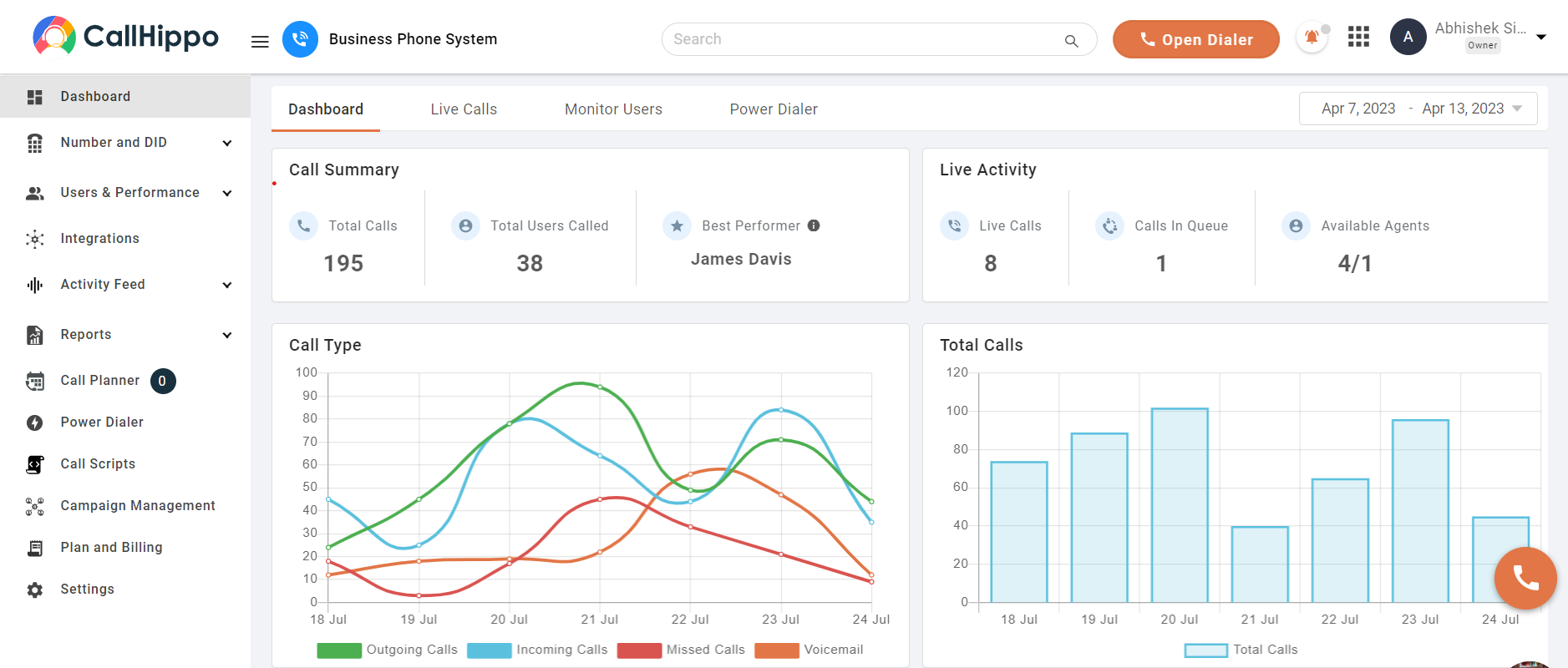
CallHippo is a cloud-based real estate phone system that offers virtual phone numbers, advanced call management features, and integration with popular CRM platforms. It caters to the needs of real estate professionals by providing a flexible and scalable communication solution.
Features
- Virtual phone number
- Power dialer
- Call management
- CRM integration
- Auto-attendant and IVR
- Mobile accessibility
CallHippo Pros and Cons
- Offers virtual phone numbers for establishing a local presence in different markets.
- Integrates with popular CRM systems for streamlined customer management.
- Provides mobile accessibility through apps and softphone functionality.
- Pricing may be higher compared to some other options in the market.
- Limited availability of advanced features compared to more robust systems.
Pricing
- Starter – $18 Per user/Month
- Professional – $30 Per user/Month
- Ultimate – $42 Per user/Month
*Pricing as of 11-06-2024.
2. Ooma
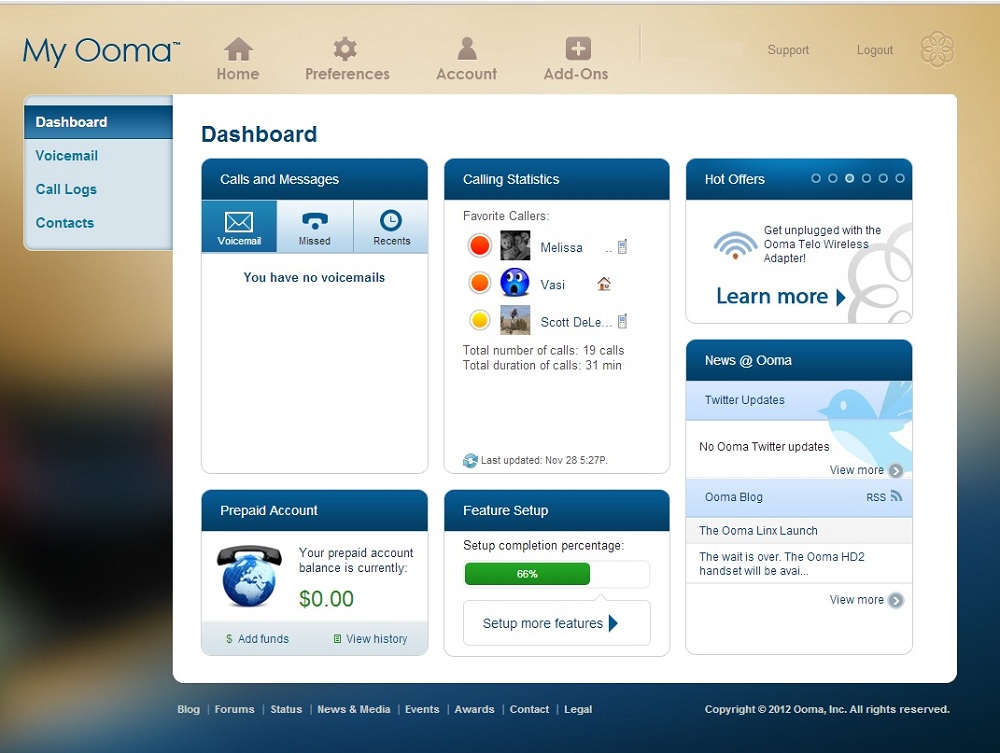
Ooma is a VoIP (Voice over Internet Protocol)-based real estate phone system that offers a cost-efficient and feature-rich solution for real estate professionals. It connects with well-known corporate programs and delivers cutting-edge communication features.
Features
- Virtual numbers
- Reports and analytics
- Call tracking and recording
- IVR
- Multi-ring functionality
- International calling
- Integration with CRM
Ooma Pros and Cons
- Leverages VoIP technology for cost-effective communication.
- Ooma provides virtual numbers with local area codes for enhanced local presence.
- Offers call management features like call forwarding and call screening.
- Some users have reported occasional call quality issues.
- Integration options with other business tools may be limited compared to other systems.
Pricing
Custom quote.
3. Nextiva
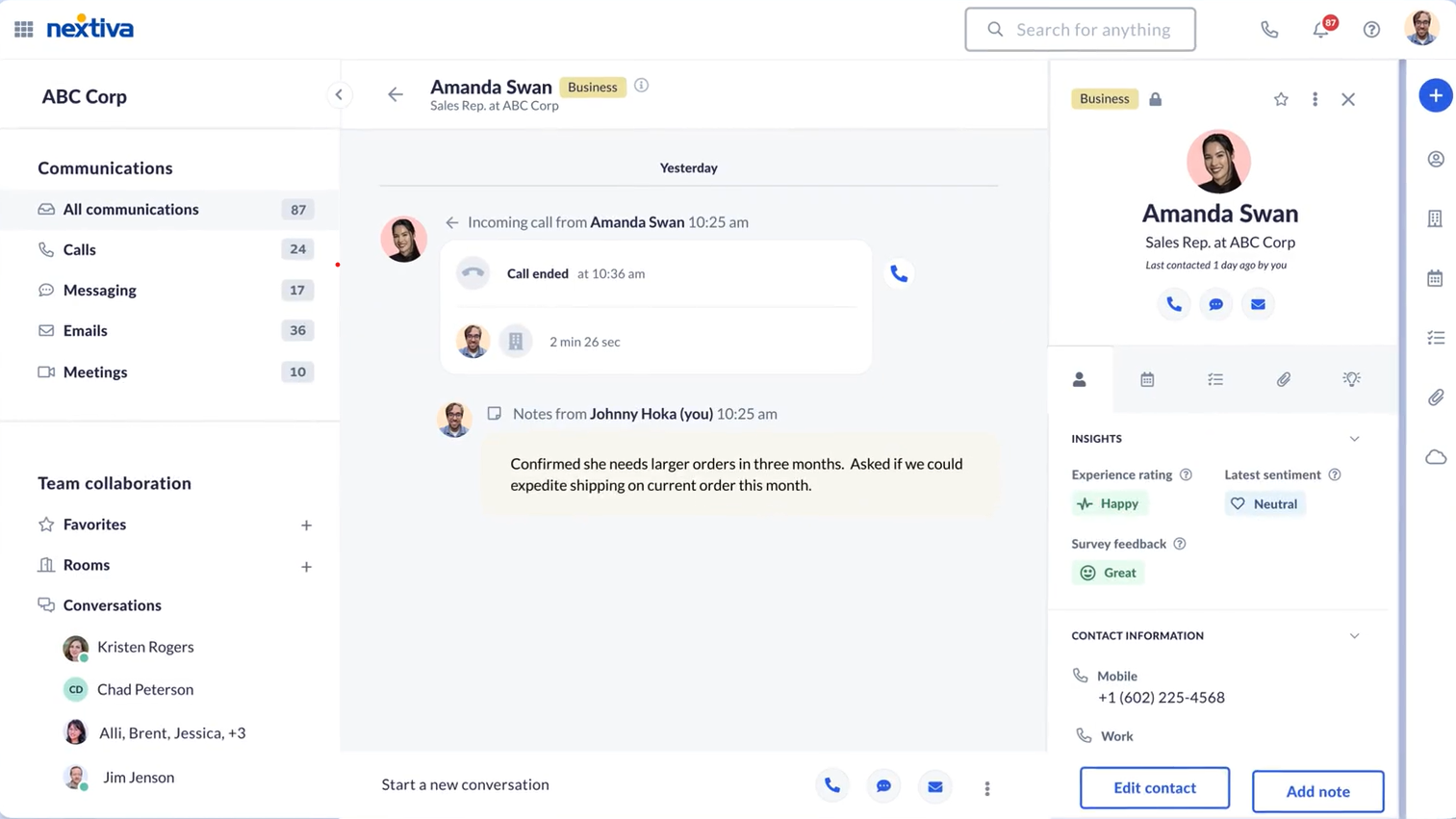
With audio, video, and team communication tools integrated, Nextiva is a complete real estate agency VoIP system. It provides a unified communication platform to improve consumer interactions and streamline communication between real estate businesses.
Features
- Voice and video call
- Team collaboration
- Auto attendant
- CRM integration
- Call management
- Mobile apps
- Team collaboration
Nextiva Pros and Cons
- Offers a comprehensive communication platform with voice, video, and team collaboration tools.
- Provides CRM integration for efficient customer management.
- Mobile apps and softphone functionality ensure accessibility on the go.
- Pricing can be higher compared to some other competitors.
- Some users have reported occasional technical glitches and customer support issues.
Pricing
- Essential: $18.95 per user per month
- Professional: $22.95 per user per month
- Enterprise: $32.95 per user per month
4. Dialpad
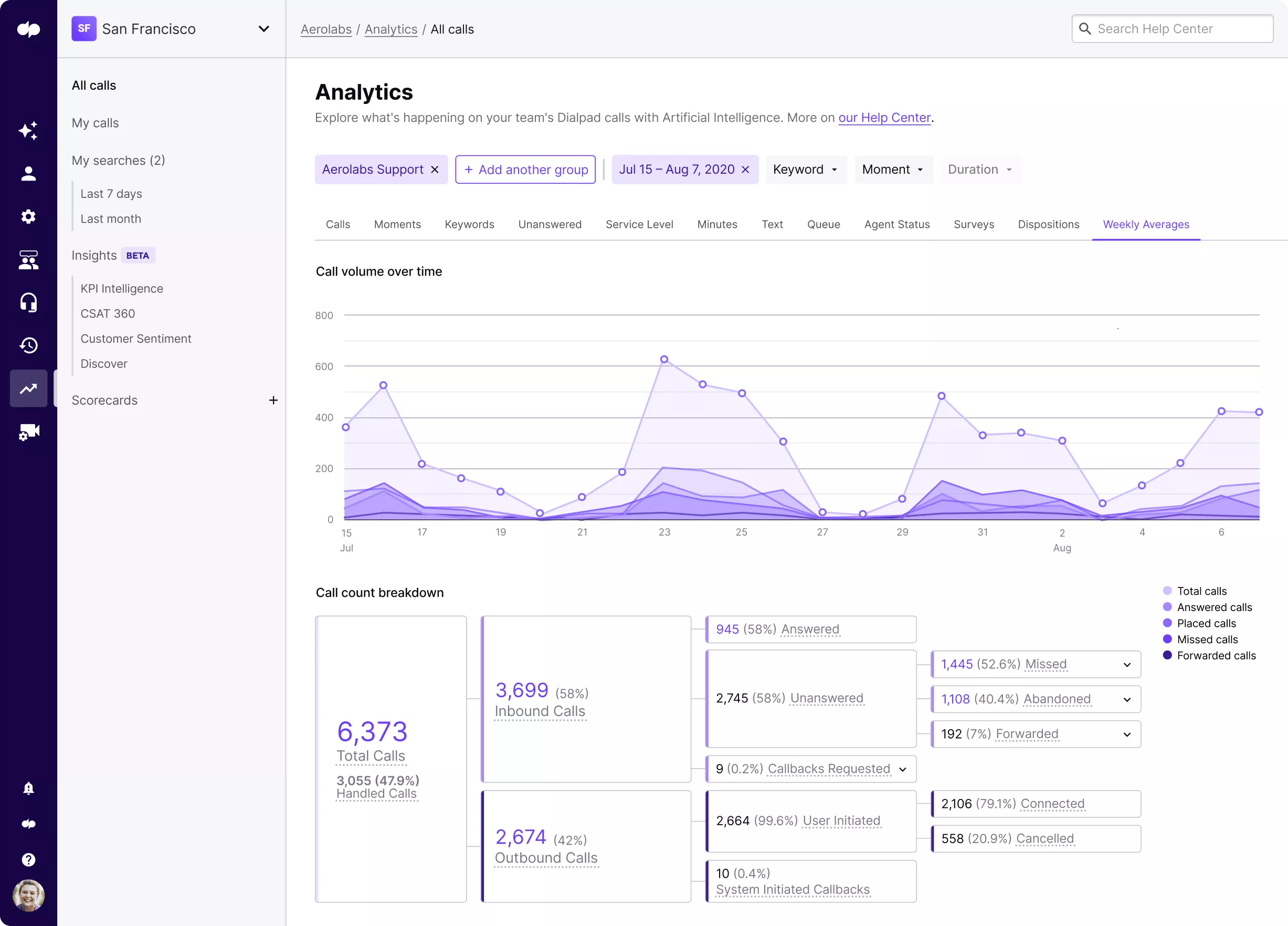
Dialpad is a chat, audio, and video platform for cloud-based communications. It offers real estate professionals a cutting-edge and simple interface to streamline communication and collaboration. This is one of the best real estate phone systems for growing real estate companies.
Features
- Voice calls
- Video calls
- Messaging
- Call management
- CRM integration
- Auto-attendant and IVR
- Mobile accessibility
- Team collaboration features
- Analytics and reporting
Dialpad Pros and Cons
- Provides voice, video, and messaging capabilities in a modern and intuitive interface.
- Offers mobile accessibility for seamless communication on smartphones.
- Integration with various tools and applications enhances workflow efficiency.
- Advanced features may require additional add-ons or higher pricing tiers.
- Some users have reported occasional call quality issues, especially in poor network conditions.
Pricing
- Standard – $15 per month per user
- Prod – $25 per month per user
- Enterprise – contact sales.
5. 8X8
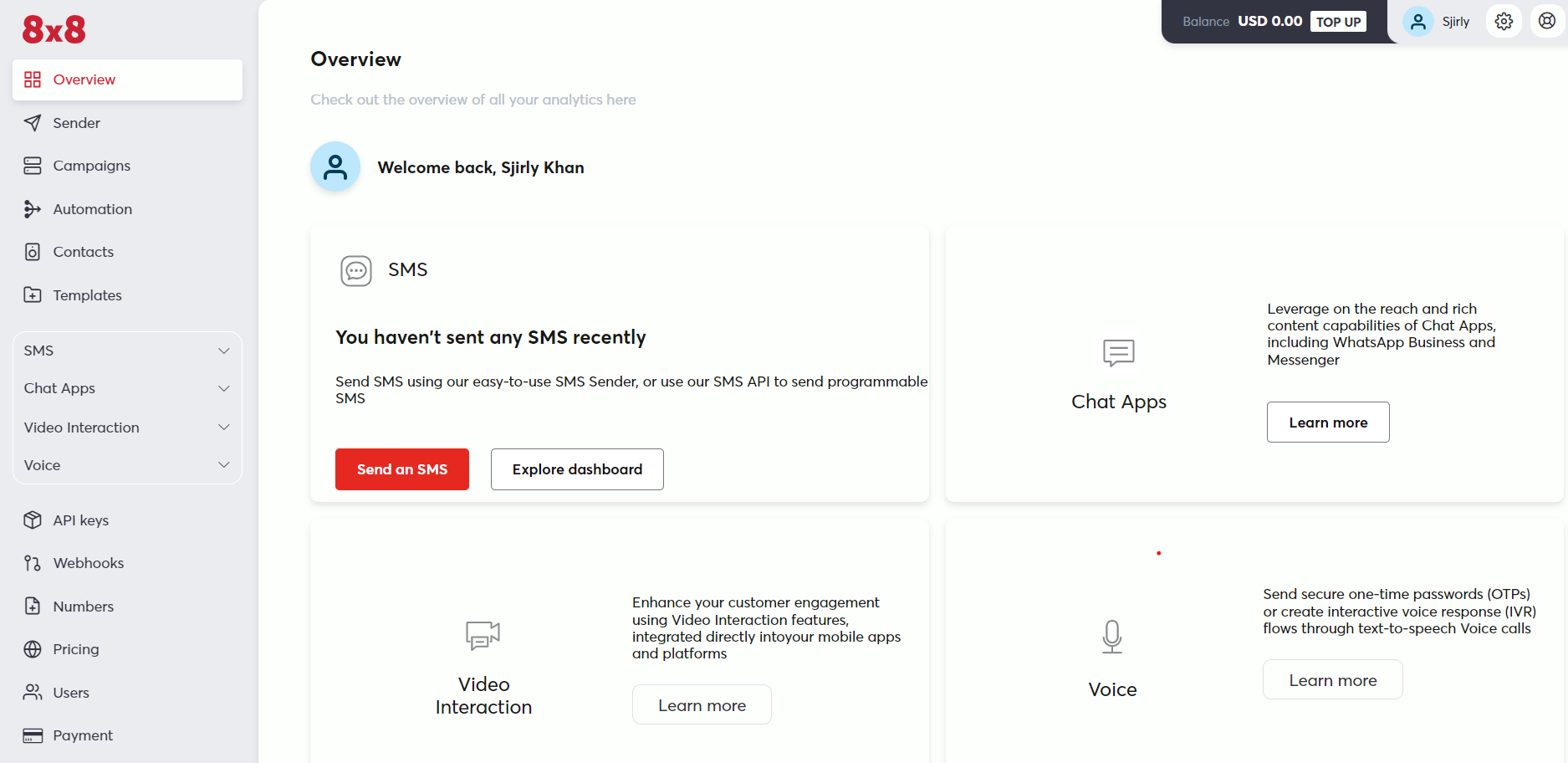
Voice, video, chat, and team messaging are just a few of the services that the cloud-based communication and collaboration platform 8×8 provides. It offers a single approach to improve collaboration and communication in real estate.
Features
- Call recording
- Call tracking
- Auto-attendant and IVR
- Mobile accessibility
- Team collaboration features
- Analytics and reporting
- Integration with tools
- Security and reliability
8X8 Pros and Cons
- Offers a range of communication features including voice calls, video calls, and chat.
- Provides CRM integration for efficient customer management.
- Mobile accessibility allows communication on the go.
- User interface and navigation can be complex for some users.
- Advanced features may require additional configuration or technical expertise.
Pricing
- X2 – $24 per user per month
- X4 – $44 per user per month
6. DialerHQ
DialerHQ empowers real estate professionals with feature-rich phone solutions to boost productivity and close more deals. Their easy-to-use phone systems include call recording, routing and texting to streamline communications with clients and teams. Robust analytics provide insights to improve lead response time and conversion rates. With customized IVR, voicemail transcription, etc., DialerHQ keeps real estate offices connected and responsive, all in one seamlessly integrated platform.
Key Features
- Call conferences
- Voicemail
- Sms/text messages
- Predictive dialer
- IVR
DialerHQ Pros and Cons
- DialerHQ offers efficient call management services, incorporating call queuing and routing features.
- Affordable subscription plans on DialerHQ cater to different budget requirements.
- Various dialing modes keep agents continuously engaged with live calls.
- DialerHQ's management features help call centers organize and prioritize contact lists effectively.
- Channel support beyond voice calls on DialerHQ is limited.
- Call quality problems, including dropped calls and call lags, have been encountered by users.
- DialerHQ offers few safety features, potentially raising some safety concerns.
Pricing
- Basic – $0 per user/ month
- Bronze – $7.99 per user/ month
- Silver plan- $11.99 per user/ month
- Platinum plan – $19.99 per user/ month
7. RingCentral
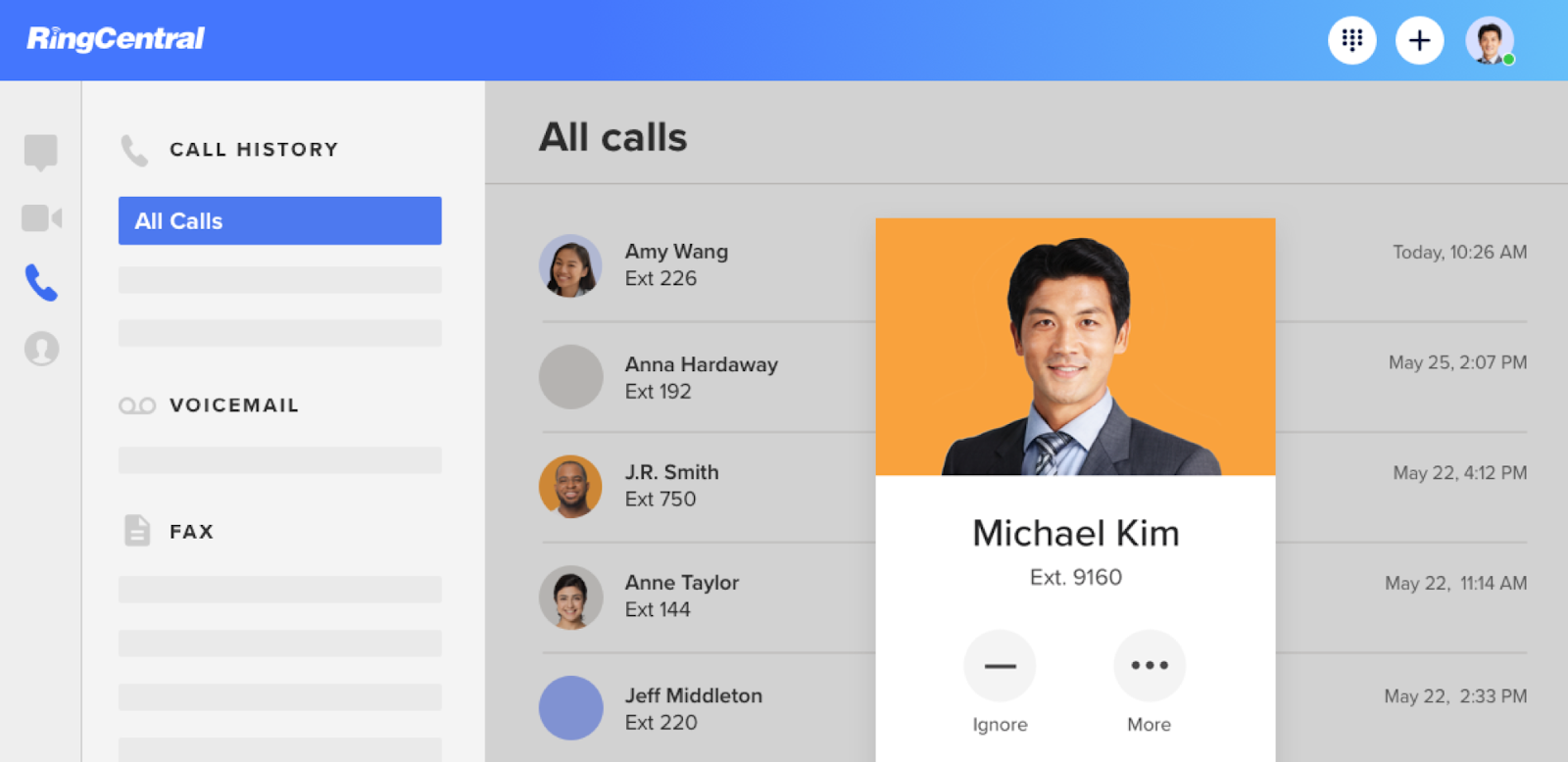
RingCentral is a cloud-based communication platform that offers voice, video, messaging, and collaboration tools. It provides a scalable solution for real estate professionals to manage their communication needs. RingCentral is a leading real estate phone system preferred by many realtors.
Features
- Auto-attendant and IVR
- Mobile accessibility
- Call tracking
- Team collaboration features
- Call forwarding
- Analytics and reporting
- Integration with tools
Ringcentral Pros and Cons
- Comprehensive communication platform with voice, video, messaging, and collaboration tools.
- CRM integration enhances customer management and data synchronization.
- Offers mobile apps and softphone functionality for on-the-go accessibility.
- Pricing can be higher compared to some other options in the market.
- User interface may require some learning curve for new users.
Pricing
- Core – $20 per user per month
- Advanced – $25 per user per month
- Ultra – $30 per user per month
8. Openphone
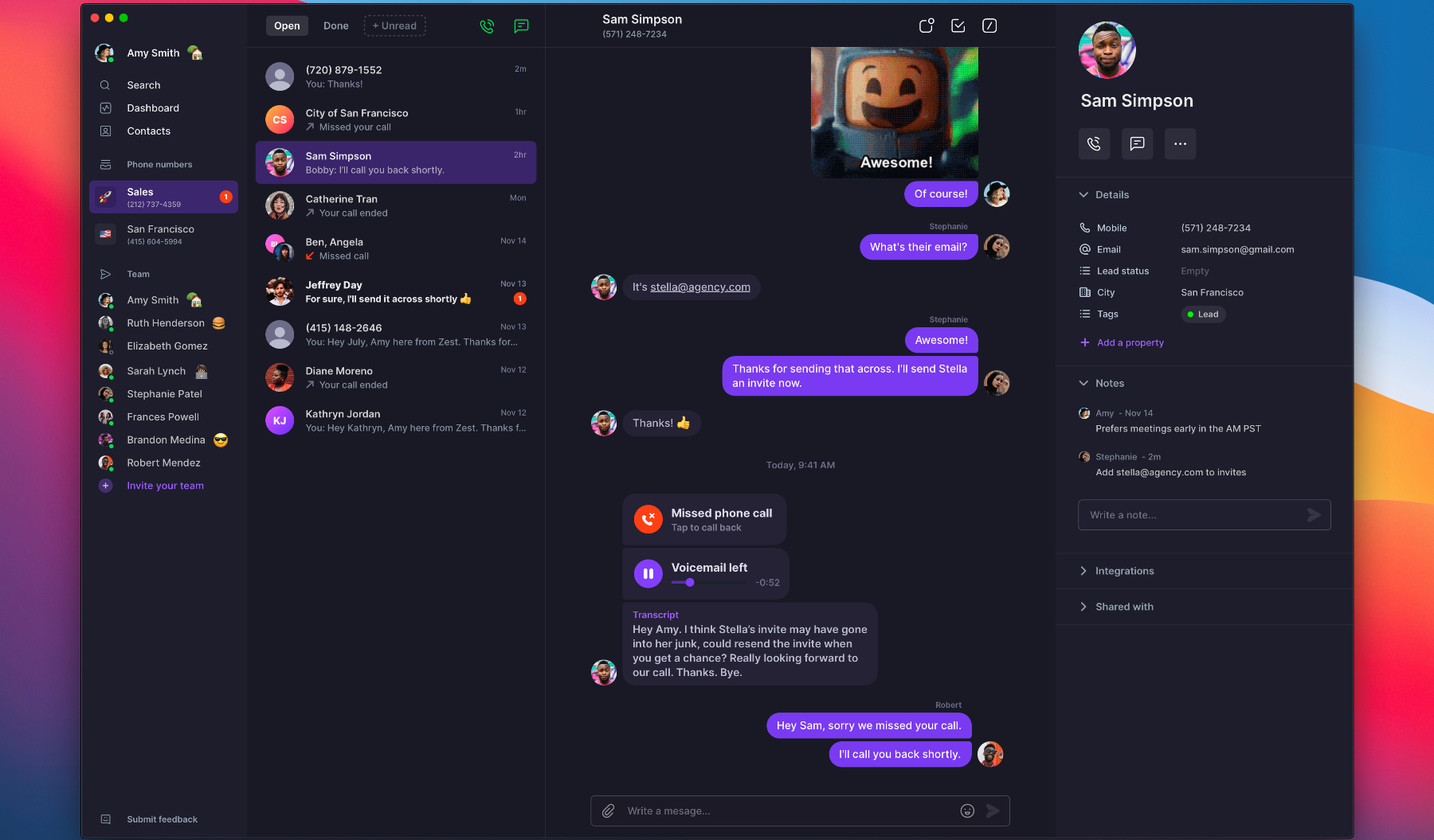
Openphone is a real estate mobile business phone system that offers a virtual phone number, call management features, and team collaboration tools. It is designed to provide a professional and flexible communication solution for real estate professionals on mobile devices.
Features
- Virtual phone number
- Call management
- Call recording
- Voicemail
- Business text messaging
- Team collaboration features
- Mobile accessibility
Openphone Pros and Cons
- Mobile business phone system designed for professionals on the go.
- Virtual phone number and call management features provide a professional communication solution.
- Offers team collaboration tools for efficient teamwork.
- It may lack some advanced features compared to more robust systems.
- Limited availability of integration options with other business tools.
Pricing
- Standard – $13 per user per month
- Premium – $20 per user per month
- Enterprise – contact sales
9. Vonage
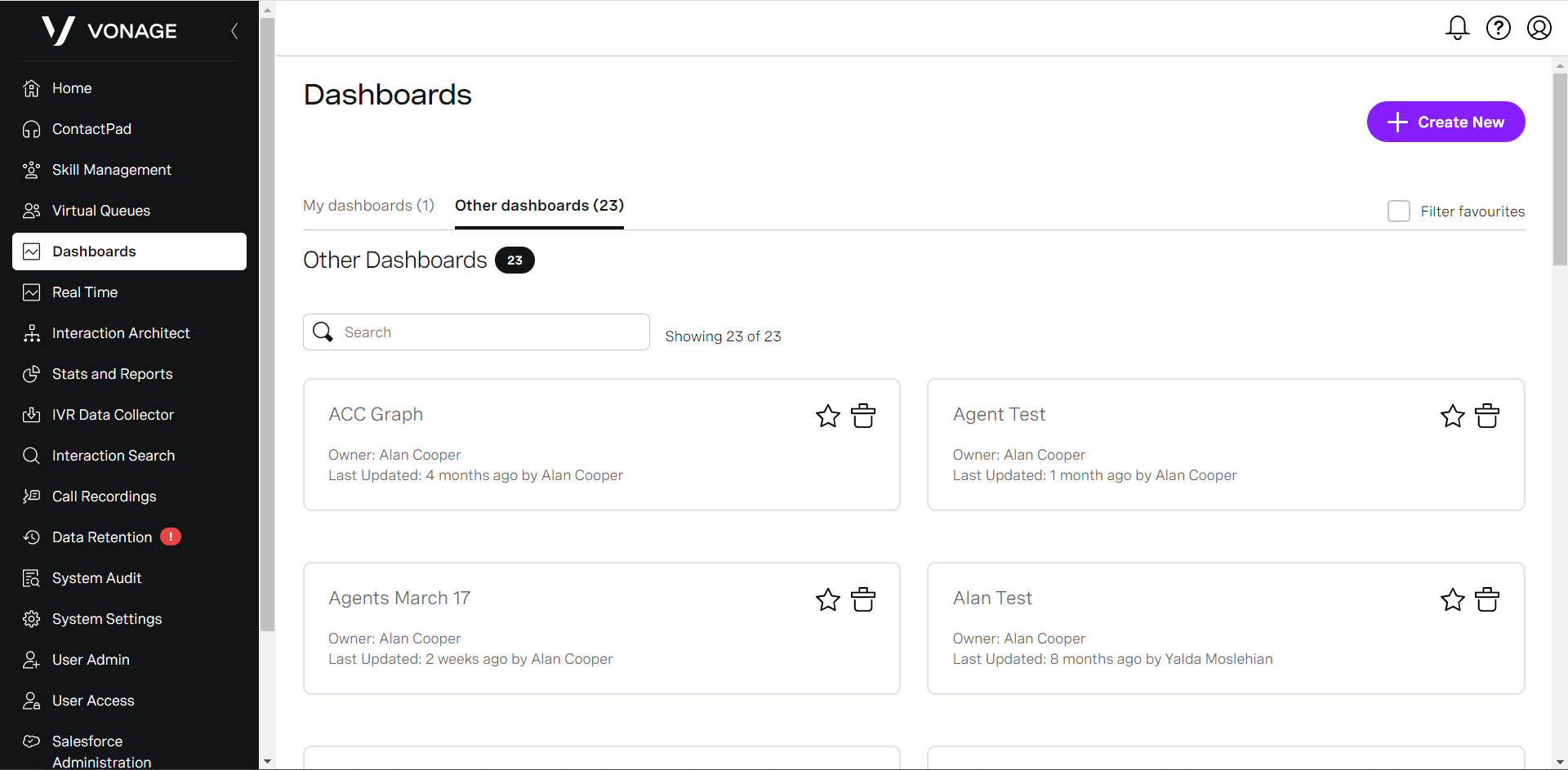
Vonage is a cloud-based communication platform for realtors that offers voice, video, messaging, and collaboration tools. It provides a scalable and feature-rich solution for real estate professionals to enhance communication and customer interactions.
Features
- Virtual phone number
- Call management
- Call tracking
- Call recording
- Voicemail
- Internal calling
- Business text messaging
- Team collaboration features
- Mobile accessibility
Vonage Pros and Cons
Pricing
Custom pricing.
10. GoTo Connect
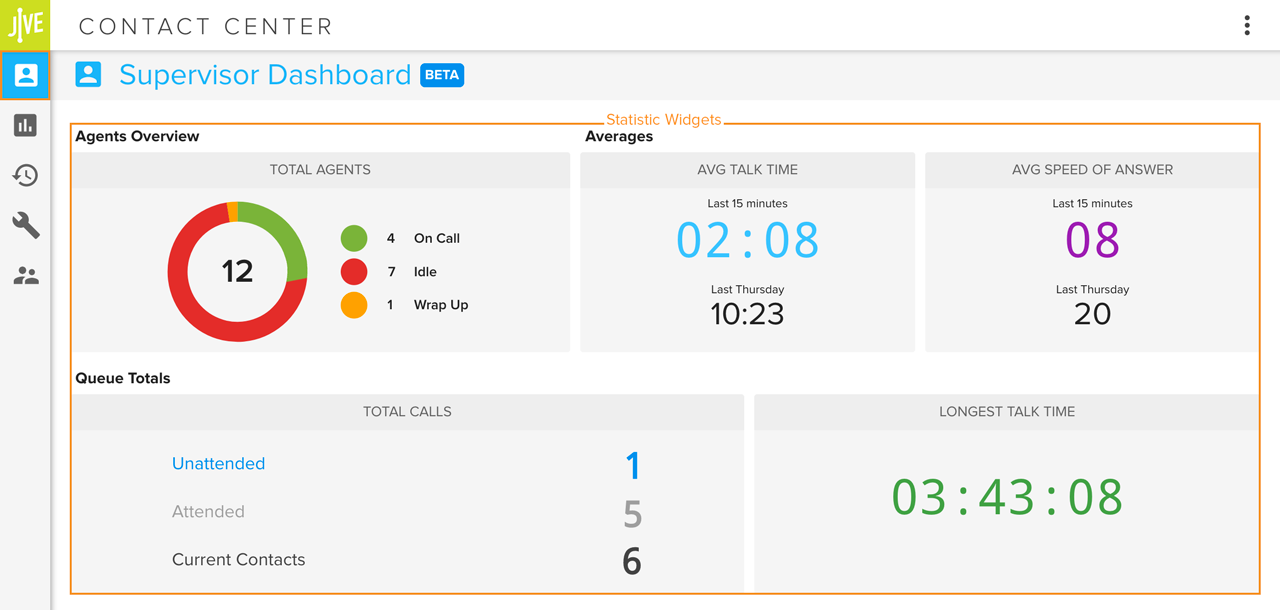
GoTo Connect is a unified communication platform that combines voice, video, and messaging tools. It offers a comprehensive solution for real estate professionals to streamline their communication, collaboration, and customer service.
Features
- Virtual phone number
- Call management
- Call tracking
- Call recording
- Voicemail
- Business text messaging
- Team collaboration features
- Mobile accessibility
GoTo Pros and Cons
- Unified communication platform combining voice, video, and messaging tools.
- Offers comprehensive features for communication, collaboration, and customer service.
- CRM integration enhances customer management and workflow efficiency.
- Pricing may be higher compared to some other options in the market.
- User interface and navigation may require some learning curve for new users.
Pricing
- Basic – $27 per user per month
- Standard – $32 per user per month
11. Grasshopper
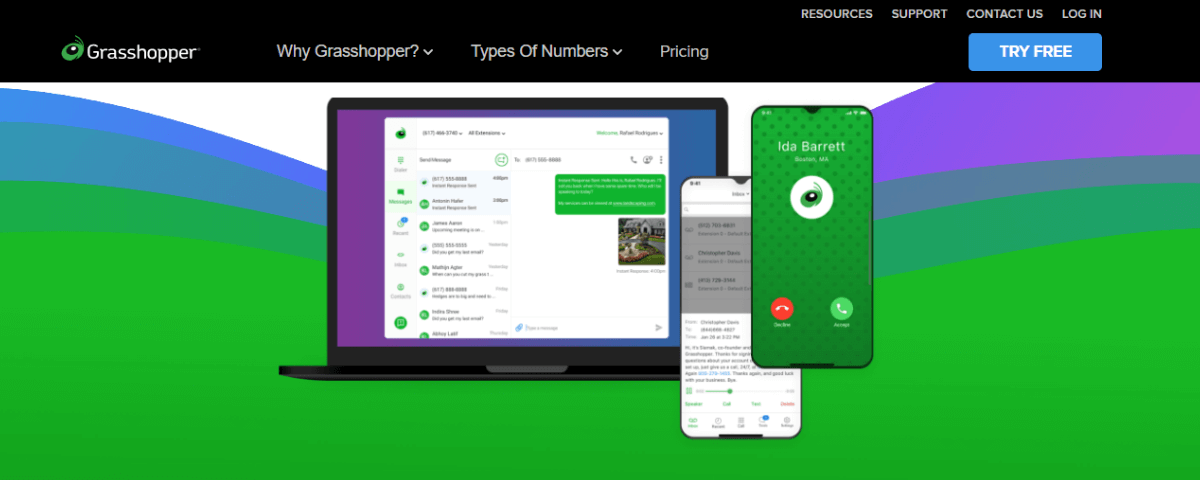
Grasshopper is a virtual phone system that provides a professional and global presence for real estate professionals. It offers features like virtual phone numbers, call management, and voicemail to help manage communication effectively.
Features
- Call recording
- Call tracking
- Auto-attendant and IVR
- Mobile accessibility
- Team collaboration features
- Analytics and reporting
Grasshopper Pros and Cons
- Unified communication platform combining voice, video, and messaging tools.
- Offers comprehensive features for communication, collaboration, and customer service.
- CRM integration enhances customer management and workflow efficiency.
- Pricing may be higher compared to some other options in the market.
- User interface and navigation may require some learning curve for new users.
Pricing
Custom pricing.
12. Zoom Phone
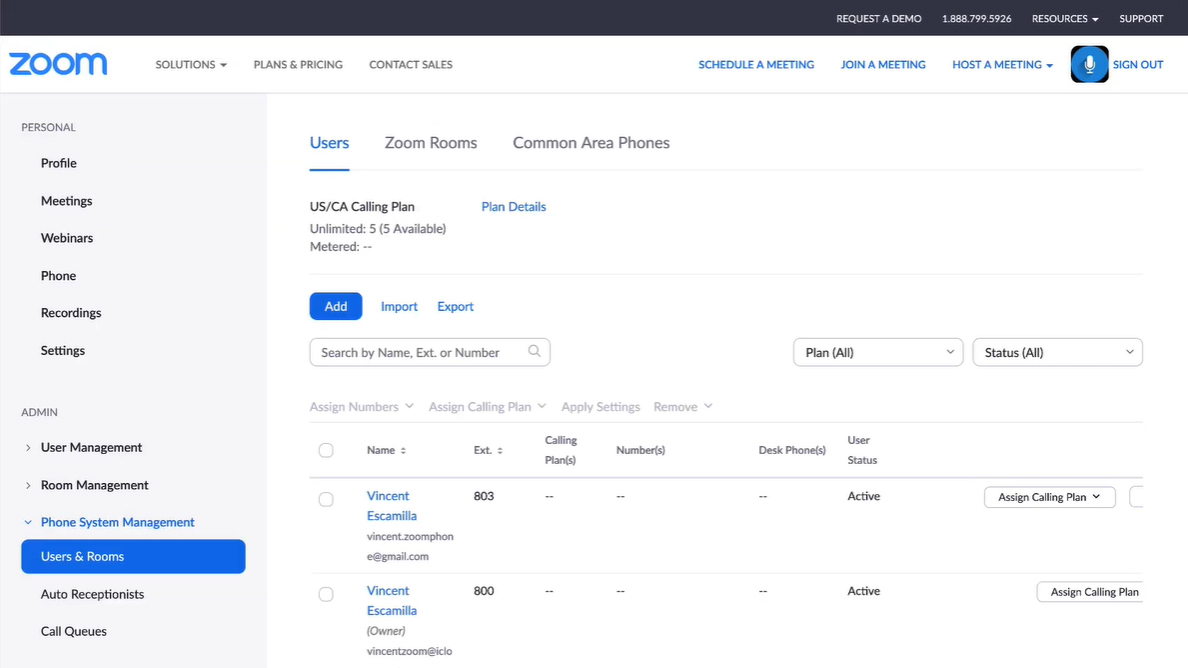
Zoom Phone is a cloud-based real estate phone system that combines traditional voice calling with modern video conferencing capabilities. Zoom’s VoIP for real estate enables real estate professionals to make and receive calls from their dedicated business phone numbers through the Zoom platform. Its integration with Zoom Meetings allows for a seamless transition from phone calls to virtual property tours and meetings, making it a versatile tool for remote collaboration and client interactions in the ever-evolving real estate market.
Key Features
- Unlimited internal & outbound calling
- Toll-free numbers
- Voicemail with transcription
- Unlimited auto attendants/IVR
- Dial by name directory
Zoom Phone Pros and Cons
- The user-friendly interface ensures effortless navigation, streamlining daily operations in the real estate sector.
- Rapid and responsive customer support minimizes downtime and enhances client satisfaction.
- Enjoy top-notch audio and video quality, ensuring crystal-clear communication during virtual property tours and meetings.
- Seamlessly switch between audio and video devices, optimizing flexibility and convenience for property presentations.
- Billing processes may present challenges, requiring meticulous attention to financial transactions.
- Occasionally, technical glitches may arise, potentially affecting the smooth conduct of virtual property showings and transactions.
- Screen-sharing issues may arise occasionally due to poor network and glitches.
Pricing
- Custom pricing
13. Aircall
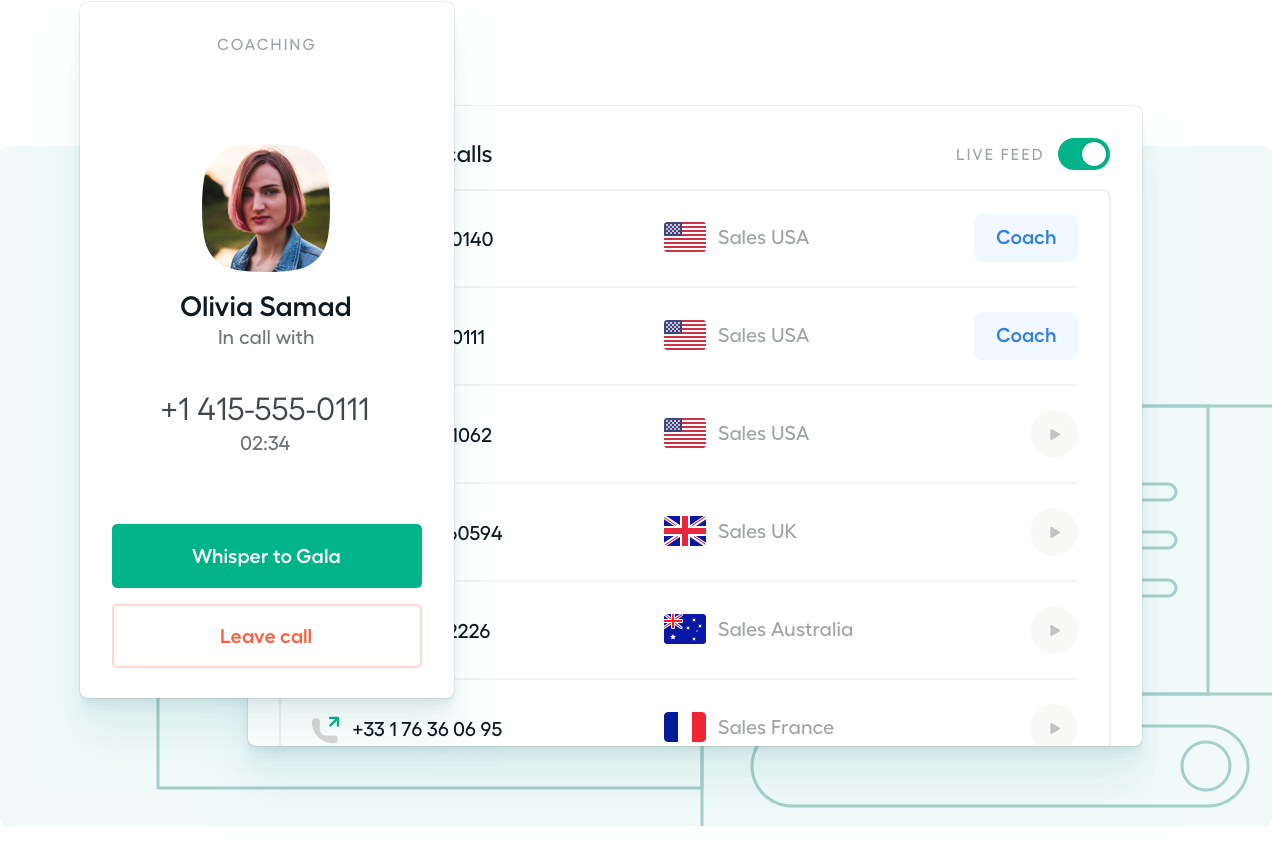
Aircall is a versatile real estate phone system provider that offers cloud-based communication solutions tailored to the unique needs of real estate professionals. Aircall enables real estate agents and agencies to efficiently manage their inbound and outbound calls, providing virtual phone numbers, call routing, queuing, and analytics tools. This real-estate IP phone system empowers real estate teams to maintain a professional and responsive communication channel, improving customer relationships and sales conversions.
Key Features
- Unlimited outbound calls
- 100+ Integrations and API access
- Custom analytics & onboarding
- Salesforce integration
- Mandatory call tagging
Aircall Pros and Cons
- Aircall enables real estate professionals to connect with clients and colleagues across various countries, facilitating global business opportunities.
- Enjoy exceptional call clarity, ensuring seamless communication during important client interactions and negotiations.
- The accompanying smartphone app offers many useful features, empowering real estate agents to manage calls, access voicemails, and stay connected.
- Setting up the service is a breeze, and adding additional numbers to your account is a simple process, streamlining your communication channels.
- Some users have reported subpar call quality, which can be frustrating during crucial conversations with clients and prospects.
- The level of customer service provided by the service provider falls below expectations, potentially causing difficulties when seeking assistance or resolving issues.
- Users may find the available customization options insufficient, restricting their ability to fully align the service with their desired branding and visual identity.
Pricing
- Essentials – $30 /user per month, billed annually, 3-users minimum
- Professional – $50 /user per month, billed annually, 3-users minimum
- Custom – Custom pricing (10 users minimum)
14. CloudTalk
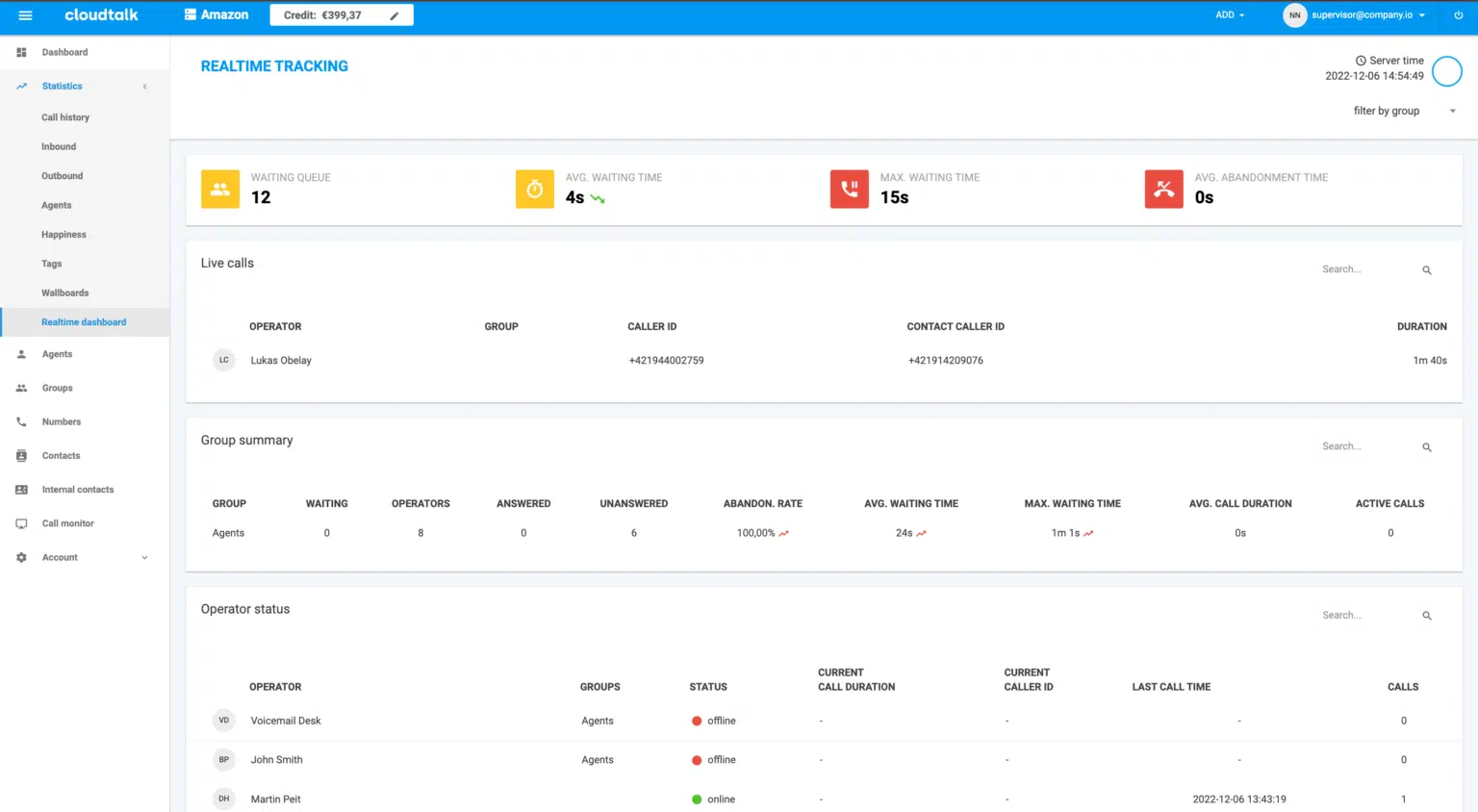
CloudTalk is a cloud-based phone system designed to streamline communication for real estate businesses. Real estate professionals can benefit from its robust CRM integration, enabling them to access client information during calls, and the platform’s analytics tools help assess call performance and customer interactions. CloudTalk enhances the productivity of real estate teams, ensuring that inquiries are promptly addressed and property transactions progress smoothly.
Key Features
- Advanced analytics with unlimited history
- Real-time client dashboard
- Call monitoring (call barging, call whispering)
- International numbers
- Enterprise-level security
CloudTalk Pros and Cons
- CloudTalk offers a variety of integration options tailored for the real estate sector, enabling seamless connectivity with essential tools.
- The platform provides comprehensive monitoring and statistical insights, allowing real estate professionals to effectively track and optimize their communication strategies.
- Real estate agents can benefit from CloudTalk's exceptional customer support, ensuring any issues or questions are promptly addressed.
- The straightforward installation and integration process makes it effortless for real estate agencies to implement CloudTalk into their operations.
- There is room for improvement in CloudTalk's Windows application, which may impact its usability in real estate.
- Real estate professionals may encounter a learning curve when first utilizing CloudTalk, requiring additional time for mastery.
- The documentation provided by CloudTalk could be clearer, which may hinder real estate teams seeking to maximize its features.
Pricing
- Starter – $25/ month billed annually.
- Essential – $30/ month billed annually.
- Expert – $50/ month billed annually.
- Custom – / month billed annually.
Importance of Having a Real Estate Phone System
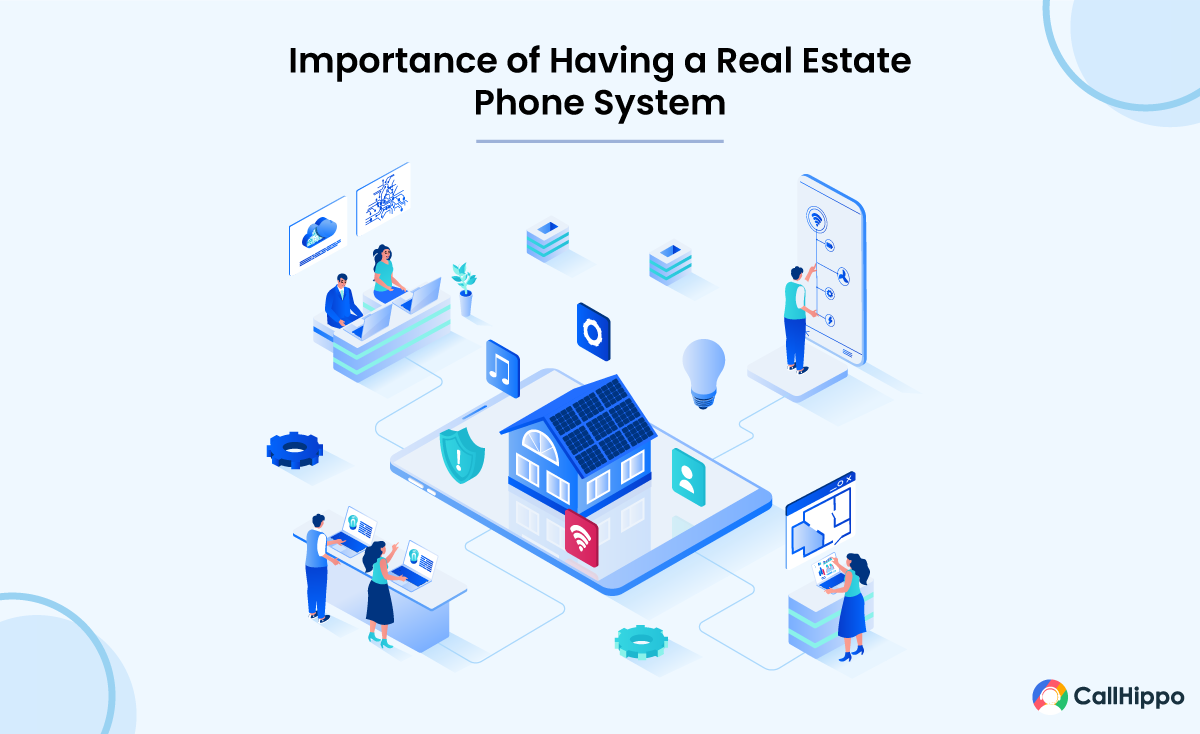
A real estate phone system is of utmost importance for real estate professionals and agencies. It provides numerous benefits that contribute to their business’s smooth functioning and success. Firstly, a real estate phone system helps maintain a professional image and enhances credibility.
By having a dedicated phone number for their business, separate from personal lines, agents establish themselves as professionals and build trust with clients and prospects. Secondly, efficient call handling is ensured with features like call forwarding and routing. Agents can redirect calls to the right person or team, minimizing missed calls and ensuring prompt attention to each caller.
This improves customer service, as real estate business phone systems offer interactive voice response (IVR) and auto-attendant functionalities. IVR allows callers to be guided through options and directed to the appropriate department or property information, enhancing efficiency and providing a seamless experience.
Auto-attendant greets callers professionally, creating a positive first impression and facilitating smooth call handling. Additionally, a real estate phone system facilitates lead capture and management.
Virtual phone numbers enable tracking and analysis of marketing campaigns, while integration with customer relationship management (CRM) software allows agents to log call details and efficiently follow up with leads. The flexibility and mobility offered by real estate phone systems are also crucial. Agents can forward calls to their preferred devices, ensuring they can stay connected with clients and prospects while on the go.
Furthermore, call recording functionality enables agents to document conversations for quality assurance, training, or legal purposes, ensuring accuracy and providing a valuable reference for reviewing client interactions.
In conclusion, a real estate agent’s phone systems are essential to maintain professionalism, handle calls efficiently, enhance customer service, capture and manage leads effectively, remain flexible and mobile, and ensure proper documentation. It empowers them to communicate effectively, build strong client relationships, and streamline business operations.
Features to Consider Before Buying a Real Estate Phone System
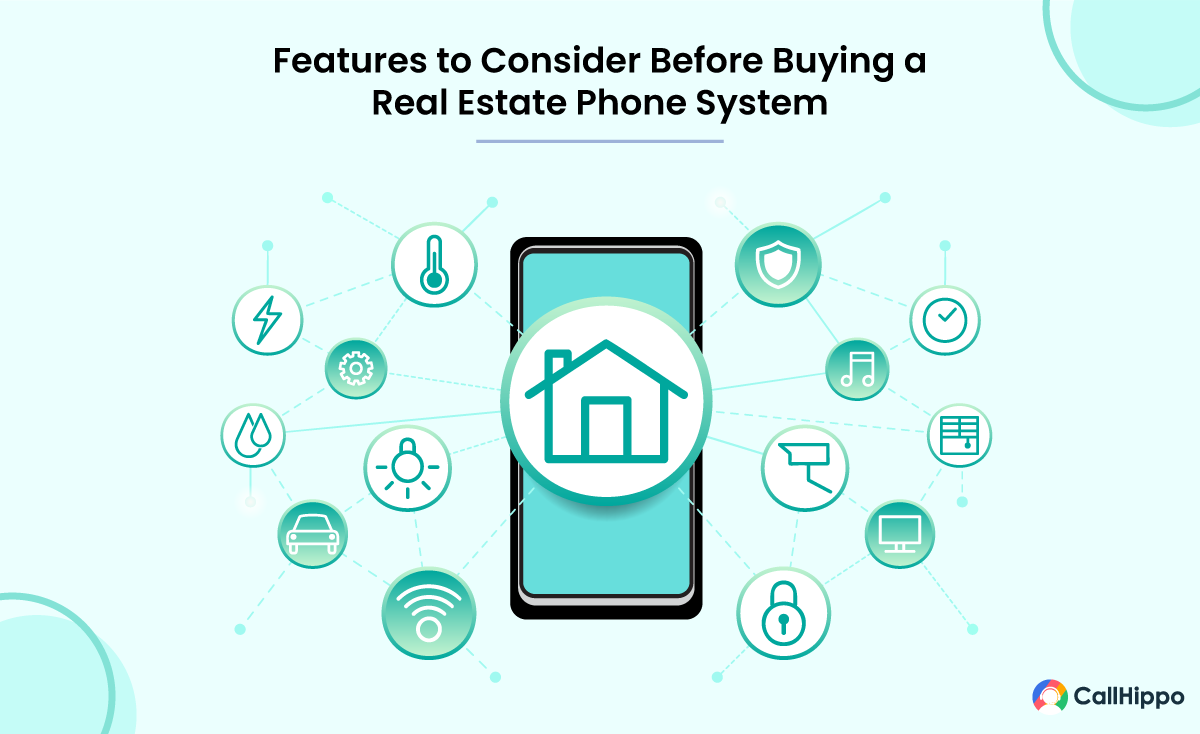
When considering buying a real estate phone system, there are several important features you should take into account. Here are some key features to consider –
1. Call management
Look for a system that offers comprehensive call management features such as call forwarding, call routing, call recording, and voicemail. These features will allow you to handle calls efficiently and ensure that no leads or inquiries are missed.
2. CRM integration
Integration with a Customer Relationship Management (CRM) system can greatly enhance your real estate operations. A phone system that integrates with your CRM will enable you to track and manage all client communication, keep detailed records, and access relevant information during conversations.
3. Auto-attendant and IVR
An auto-attendant or interactive voice response (IVR) feature can help automate call handling by allowing callers to select options from a menu, directing them to the right department or individual. This feature improves professionalism and ensures callers reach the right person quickly.
4. Mobile accessibility
Real estate professionals are often on the move, so it’s important to have a phone system that supports mobile accessibility. Look for features like mobile apps or softphone functionality, which allow you to make and receive calls using your mobile device, ensuring you’re always reachable.
5. Virtual numbers
Virtual numbers are beneficial for real estate agents as they allow you to have multiple local or toll-free numbers without needing separate physical lines. This enables you to establish a local presence in various markets or create dedicated lines for marketing campaigns.
6. Call analytics and reporting
Call analytics and reporting capabilities to provide insights into call volumes, call durations, missed calls, and other call-related metrics. These insights can help you make data-driven decisions, optimize your marketing efforts, and improve customer service.
7. Team collaboration features
If you work as part of a team, consider features that facilitate collaboration, such as call transfer, call queuing, and internal messaging. These features can streamline communication within your team, ensuring seamless coordination and better customer service.
8. Scalability
Consider your future growth plans when selecting a real estate phone system. Choose a system that can scale with your business, allowing you to easily add new lines or users as your team expands.
9. Integration with other tools
Evaluate if the phone system can integrate with other tools and services you use, such as email, calendars, and other communication platforms. Seamless integration can enhance productivity and simplify workflow.<
10. Security and reliability
Real estate transactions involve sensitive and confidential information. Ensure that your phone system has robust security measures, such as encryption, secure data storage, and compliance with relevant regulations. Reliability is also crucial, so consider the system’s uptime, backup options, and disaster recovery capabilities.
How to Choose the Right Real Estate Phone System?
Choosing the right phone system for real estate requires careful consideration of several factors. Here’s a step-by-step guide to help you make an informed decision.
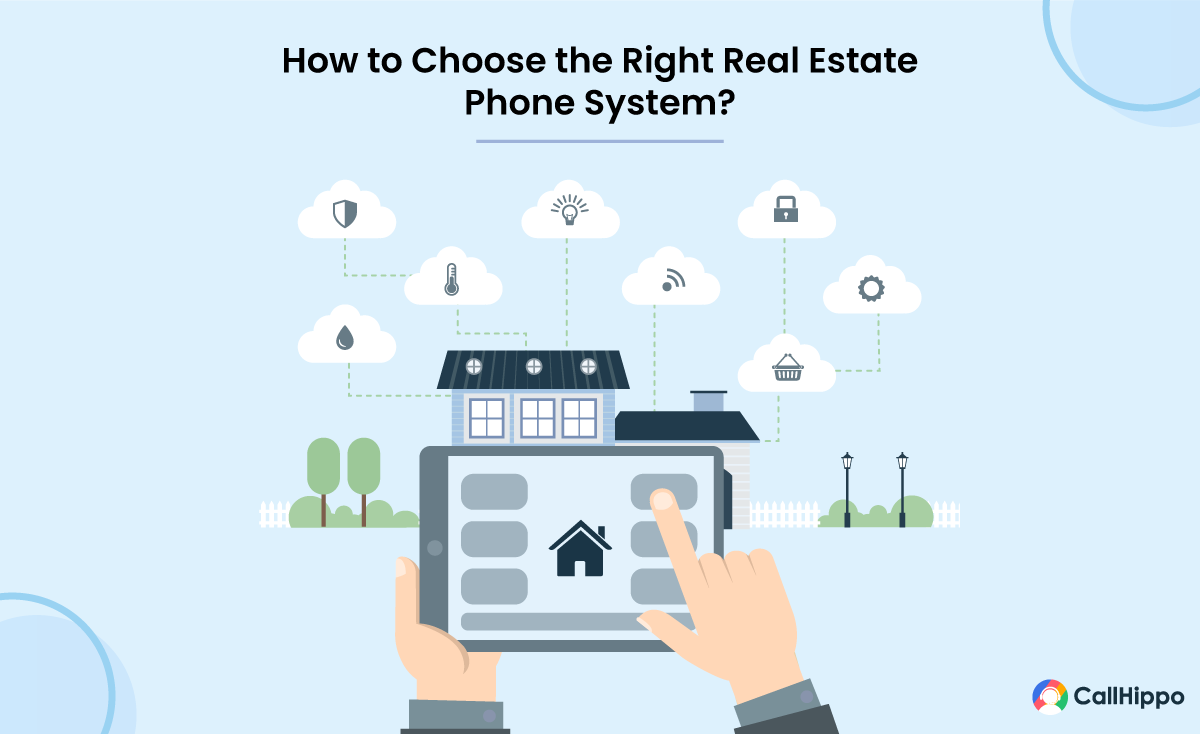
1. Assess your business needs
Start by evaluating your specific requirements. Determine the number of users needing phone access, the call volume you anticipate, and any special features or integrations you require. Consider factors like team collaboration, mobile accessibility, and scalability based on your business size and growth plans.
2. Research available options
Conduct thorough research on different real estate phone system providers. Look for reputable vendors with experience in the industry and positive customer reviews. Consider factors like features, pricing, customer support, and the ability to customize the system to your needs.
3. Consider essential features
List the essential features you need for your real estate operations. This could include call management, CRM integration, auto-attendant/IVR, mobile accessibility, virtual numbers, analytics and reporting, team collaboration features, and security measures. Use this list as a benchmark while evaluating different systems.
4. Compare pricing and plans
Request pricing information from the shortlisted vendors. Compare their pricing structures, including setup fees, monthly charges, and any additional costs for add-ons or premium features. Ensure that the pricing aligns with your budget and the value you expect from the system.
5. Request demos or trials
Reach out to the vendors and request demos or trials of their phone systems. This will allow you to get hands-on experience with the user interface, test out the features, and assess the overall usability and functionality of the system. Pay attention to ease of use, navigation, and the interface’s intuitiveness.
6. Evaluate integration options
Consider the existing tools and software you use in your real estate business, such as CRM platforms, email clients, and other communication tools. Verify that the phone system you choose can seamlessly integrate with these tools, which will streamline your workflow and data management.
7. Assess customer support
Evaluate each vendor’s level of customer support. Check their availability, response time, and the support channels they offer (e.g., phone, email, live chat). Reliable customer support is crucial, ensuring prompt assistance and resolution of any issues.
8. Seek recommendations
Reach out to fellow real estate professionals or industry associations for recommendations. Ask for their experiences with different cloud based phone systems and any insights they can provide. Their feedback on making phone calls and tracking them can help you gain valuable insights and avoid potential pitfalls.
9. Check vendor reputation and reliability
Research the reputation and reliability of the vendors you are considering. Look for their industry track record, financial stability, and data security and privacy commitment. A trustworthy and reliable vendor will provide peace of mind and ensure a smooth experience.
10. Make an informed decision
After considering all the above factors, weigh the pros and cons of each phone system option. Consider the features, pricing, integrations, customer support, and vendor reputation. Choose the system that best aligns with your requirements, budget, and long-term business goals.
By following these steps, you can make an informed decision and select the right VoIP for real estate to streamline your communication, enhance productivity, and provide a positive experience for your team and clients.
Conclusion
Choosing the right real estate phone system is crucial for ensuring efficient communication, enhancing customer interactions, and streamlining workflow within the industry. After reviewing and comparing several popular options, it is clear that each system has its strengths and weaknesses.
CallHippo offers virtual phone numbers, CRM integration, and mobile accessibility, making it a flexible choice for real estate professionals. So, get a free trial today and start communicating with your clients!
FAQs
1. How much does a real estate phone system cost?
Real estate phone system costs vary depending on the provider and features, ranging from a few hundred dollars to several thousand dollars per month.
2. What is the best phone system for small real estate businesses?
The best phone system for small real estate businesses depends on their specific needs. Some popular options include virtual phone systems, VoIP services, or cloud-based systems tailored for small businesses. One of the best phone systems for real estate business is CallHippo.
3. Which type of phone number is ideal for the real estate business?
An ideal phone number for a real estate business is a local number in the area where the business operates. It helps establish a local presence and builds trust with potential clients.
4. Are these phone systems suitable for small and large real estate businesses?
Yes, these phone systems are suitable for both small and large real estate businesses. They can scale according to the business’s size and requirements, accommodating the needs of a growing organization.
5. Can I customize these phone systems according to my brand and preferences?
Many real estate phone systems offer customization options. You can often customize features, greetings, hold music, and branding elements to align with your business’s brand and preferences.

Subscribe to our newsletter & never miss our latest news and promotions.









